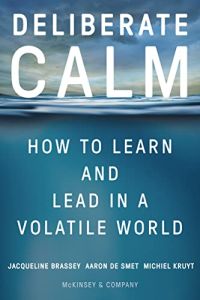加入 getAbstract 阅读摘要

加入 getAbstract 阅读摘要
Jacqueline Brassey, Aaron De Smet and Michiel Kruyt
Deliberate Calm
How to Learn and Lead in a Volatile World
HarperBusiness, 2022
看看什么内容?
Leaders who remain deliberately calm can master themselves and handle challenging circumstances.
Recommendation
Self-mastery is the path to success, write McKinsey experts Jacqueline Brassey, Aaron De Smet and Michiel Kruyt. Their “Deliberate Calm” program draws from advanced neuroscience and leadership development practices to teach leaders how to handle challenges and crises with focus, resolve and self-discipline. They tell leaders how to manage their internal emotional environment and their external circumstances by following a four-week self-governance program and exercising four main skills,“adaptability, learning agility, awareness and emotional self-regulation.” The information on learning agility is sparse, but they present the other three areas and their self-development program with clarity and expertise.
Summary
About the Authors
Jacqueline Brassey is a senior knowledge expert in McKinsey & Company’s People and Organizational Performance Practice. Aaron De Smet is a senior partner at McKinsey. Michiel Kruyt is a boardroom consultant and a McKinsey alum.























Comment on this summary